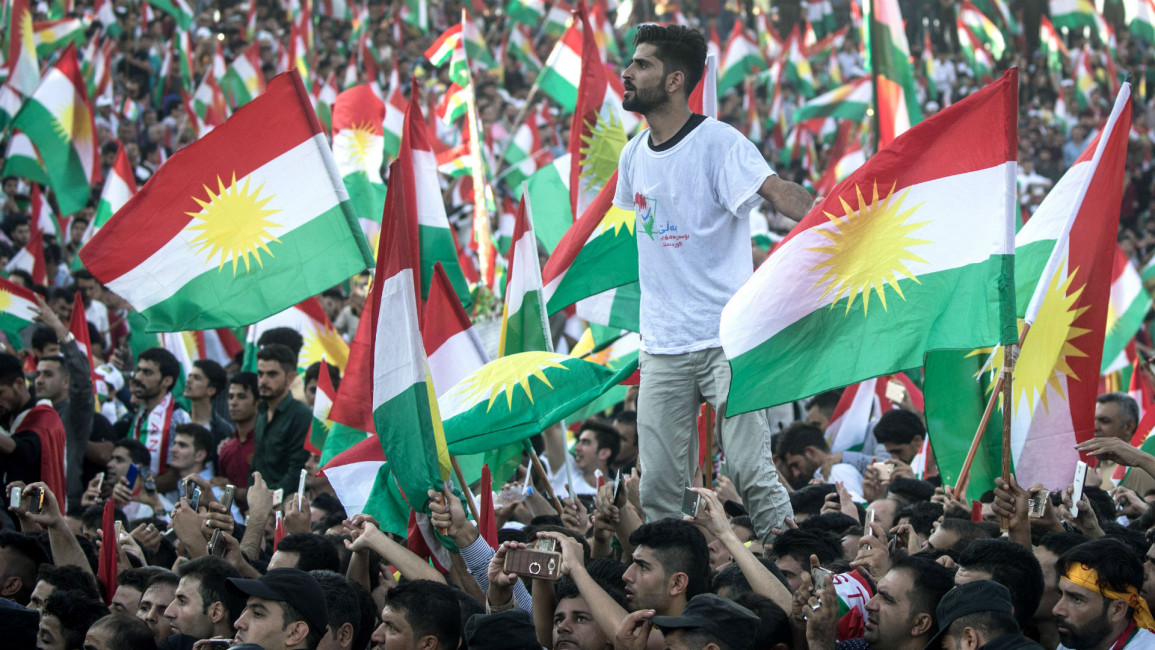Kurds push ahead with independence vote despite regional concerns
 |
|
It warned that Ankara was prepared to use its "rights" in line with international agreements, without specifying what action it could take.
Meanwhile, a commander of Iran's Revolutionary Guards, Major General Qassem Soleimani, held talks with Barzani in Erbil.
"It's his last visit before the referendum to advise Kurdish officials that Iran is seriously hostile to it and warn them to call it off," a provisional source said.
Regional concerns
Turkey and Iran both have large Kurdish populations and fear the vote in northern Iraq could stoke separatist ambitions at home.
Iraq's central government is staunchly opposed to the referendum in the oil-rich Kurdish region and has said it violates the Iraqi constitution.
Baghdad suspended payments to Barzani's regional government in 2014 after a dispute over oil exports.
The payments, 17 percent of Iraq's national budget, were worth around $12 billion and made up 80 percent of the Kurdish region's budget revenues, leading to a reduction in wages for Kurdish Peshmerga fighters.
"The Iranians are still pushing for negotiations between Kurdistan and Baghdad," a provisional source said.
Soleimani has told Kurdish officials that "Iran is pressuring Baghdad so it accepts Kurdish demands and solves the issues of the budget, peshmerga salaries and disputed areas".
Disputed areas
Since 2003, Iraqi Kurdistan has been made up of the three provinces of Erbil, Dohun and Sulaimaniyah, but its leaders have laid claim to other areas that are constitutionally under Baghdad's authority, including the oil-rich province of Kirkuk.
The Iraqi Kurds would like these disputed areas to take part in the vote, leading to strong warnings.
In the town of Tuz Khurmatu in the province of Salaheddine, an official from the Hashd al-Shaabi Shia paramilitary group has said he will not allow the poll.
"We're ready for a fight to the death," said Atef Annajar, whose group is dominated by Iranian-backed Shia fighters, adding however that "the leadership is trying to calm the situation".
 |
Since 2003, Iraqi Kurdistan has been made up of the three provinces of Erbil, Dohun and Sulaimaniyah, but its leaders have laid claim to other areas |  |
Hadi al-Ameri, head of the powerful Iran-backed Badr organisation, last week vowed to defend the unity of Iraq, warning that the poll could trigger partition and civil war.
On the political front, Iraqi Prime Minister Haider al-Abadi said this week he rejected an independence referendum under any form, even non-binding.
The poll was "rejected, whether today or in the future," he said.
Saudi Arabia has also urged Barzani to cancel the referendum to avoid further "crises" in the region.
On Thursday, the UN Security Council warned that the referendum was "potentially destabilising".
The council urged "dialogue and compromise" to address differences between the Iraqi government and the regional authorities.
It also said the vote could weaken the military campaign against the Islamic State group, "in which Kurdish forces have played a critical role".
Kurds have sought an independent state since at least the end of World War One, when colonial powers divided up the Middle East after the collapse of the multi-ethnic Ottoman Empire.



